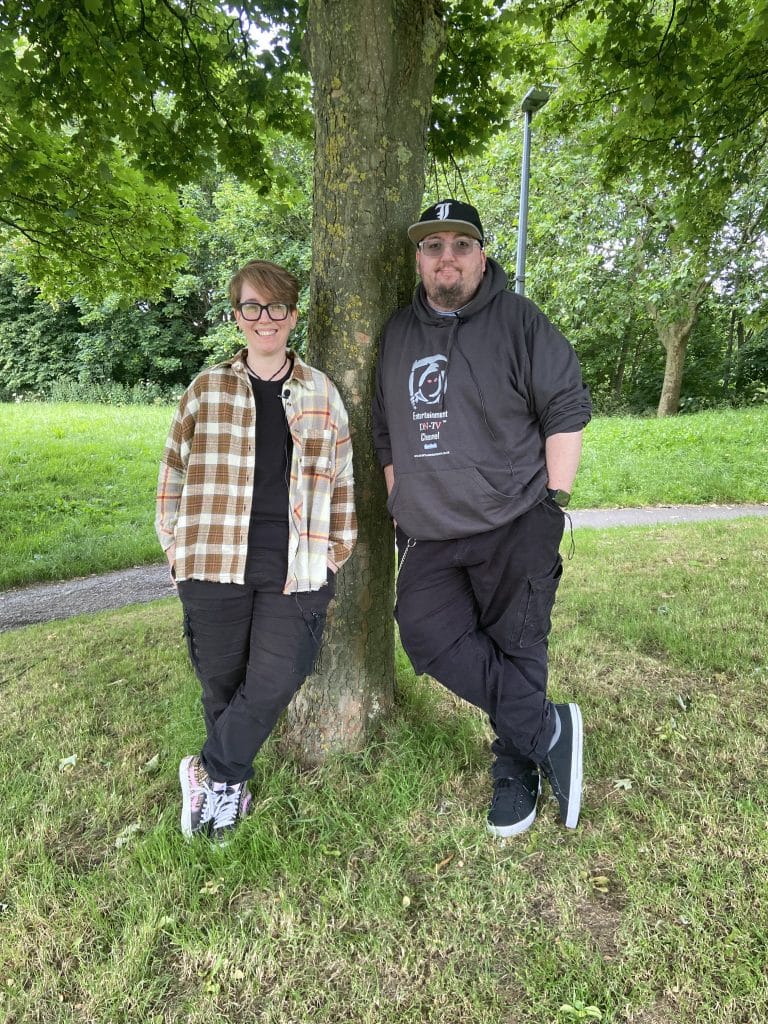Breaking the stigma of ‘man up’
This World Suicide Prevention Day, Drew shares his story with us, how his bond with his Hope Project worker Ezra helped him overcome barriers in his life, and his thoughts on breaking the stigma of ‘man up’.
Content warning: this article contains mentions of suicide
Drew came to Hope in October 2023. He has complex mental health difficulties and learning disabilities. He was struggling living with his mum and in fact the first day he met Ezra she sorted him with some emergency housing that very day. And then he moved to Salvation Army’s hostel Logos House.
“I lost myself, I lost everything. I felt I was in a different world and couldn’t control my emotions. I felt nothing was in my control.”
Drew has been the target of bullying his whole life, people seeing his disabilities before seeing him. Even the medical professionals tended to treat his disabilities rather than seeing the mental health struggles.
“My ADHD is a pain the butt. It’s so annoying. I get judged everywhere. It’s not fair. I’m also struggling with my mental health but I felt invisible, I felt the GPs weren’t listening to me.”
It took time to form a bond with Ezra. For one thing he couldn’t eat in public and was wary of being out in public. They would walk and talk, go to places they both were interested in, e.g. HMV, browsing around shops.
When Ezra finished her work with Drew at the end of May, he found the ending hard. He’s now with our Help When You Need It service which offers very different support. But Drew is in a hugely better place from when they first met in October last year.
On their last meeting Drew took Ezra to Castle Park in Bristol and spoke to her about how things had been with him when they first met. He explained how things had felt too much for him and how he wanted to give up and go into the water and not come back.
“I didn’t want to be in this world anymore. I felt hurt by family, my girlfriend, by my life.”
But the love for his son stopped him from going through with his plan and he determined to focus on seeing him and being there for him.
Vulnerable and unsettled
Drew has had a tough life, bullied as a child and then having to escape a violent family in Wales as a young man. Drew was having relationship difficulties and needed to get his own accommodation, which meant needing to temporarily stay at Logos House.
Drew is vulnerable, and felt unsafe while at Logos House. It’s only been through his relationship with Ezra that he’s started to feel safe. She helped him find a flat of his own where things are far more settled and peaceful for him.
“I like one-to-ones best. Ezra showed me how to build back up and be confident again. She made me feel safe and literally gave me back my life. No other support system has been like it, here I’ve found my confidence again. She’s inspired me to be the person I want to be.”
Ezra says while it’s important we talk about the serious stuff, we also do the light stuff and the fun stuff too. “We laugh a lot together”. And that’s important. She explains it’s important for Drew to take control because for so much of his life things have been taken out of his control and he’s not been acknowledged or respected for his ideas and feelings.
Next steps
Ezra’s been helping Drew understand what he can have control over and what remains out of his control. They do grounding exercises together to help Drew keep focused and feel safer. He calls his son every day and sees him regularly and says he wants to stay in Bristol and get a life here.
He’s applied to Second Step’s Volunteering team about becoming a peer mentor to help other men talk about their feelings and their mental health. He says he wants to give back.
“It’s ok for men to have mental health problems, but so many don’t think it is, they think they’re weak and that’s why they take their own lives. I understand and I want to help.”

About the Hope Project
Ezra works with the Hope Project, our male suicide prevention project which provides emotional and practical support to men aged 30-64 living in Bristol, North Somerset and South Gloucestershire who are in psychological distress due to their finances, housing or employment circumstances.
Find out more about the Hope Project here.
World Suicide Prevention Day 2024
Latest figures show suicide rates in England and Wales are at the highest level since 1999. Middle-aged men continue to be at higher risk of suicide than any other demographic.1 We want to challenge the barriers that stop people getting the support they need, and raise awareness of the support out there so people can get the help they need earlier.
Follow us on social media to stay up to date with our latest news and stories, @wearesecondstep on Instagram and X or on LinkedIn here.
For information about suicide prevention, including accessing support if you’re having trouble coping, understanding the signs that someone may be having suicidal thoughts, and what to do if you’re worried about someone, visit the Samaritans website here.
Read next…
- Changing Futures Bristol publishes new impact report highlighting the programme’s successes
- Rebecca’s Story: “Volunteering got me back into a place of living, rather than existing”
- Celebrating community for Mental Health Awareness Week
- How My Team Around Me is changing the way we work
- National recognition for Bristol Community Rehabilitation Team
- https://www.ons.gov.uk/peoplepopulationandcommunity/birthsdeathsandmarriages/deaths/bulletins/suicidesintheunitedkingdom/2023 ↩︎
